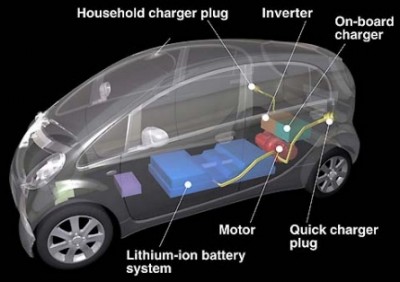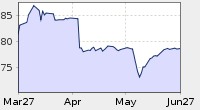 During the past decade the attention for electric cars increased significantly. Israel, Denmark, Portugal and America (California) are examples of countries where electric cars will be implemented on a large scale and where a charging infrastructure for these cars will be realised. The necessary battery technology is developing rapidly which stimulates large and small car manufacturers to develop a production line for electric cars. Considering the current developments it is interesting to analyse the costs and benefits of electric cars compared to cars with a combustion engine.
During the past decade the attention for electric cars increased significantly. Israel, Denmark, Portugal and America (California) are examples of countries where electric cars will be implemented on a large scale and where a charging infrastructure for these cars will be realised. The necessary battery technology is developing rapidly which stimulates large and small car manufacturers to develop a production line for electric cars. Considering the current developments it is interesting to analyse the costs and benefits of electric cars compared to cars with a combustion engine.
What is the Electric Car
Cost differences between electric cars and cars with a combustion engine depend on their differing drive-trains. Except for the body work of the cars there are big differences in their drive-trains (Figure 1). The electric car is powered by an electric motor which receives its electricity from an onboard battery. In the majority of electric cars which are developed at the moment Lithium-ion polymer batteries are used which combine a high energy density with durability and safety.
The inverter which is placed in between the battery and the electric motor converts the DC battery output to the AC input of the electric motor and car electronics. The electric can be charged in several hours by plugging it in the home electricity grid or in fifteen minutes by connecting it to a high voltage charging station.
Cost comparison
The costs of a car can be divided in depreciation costs, fuel costs, maintenance costs and fixed costs. The fixed costs of the car consist of road tax, insurance and the membership of the AA patrol.
The costs of the electric car and the car with a combustion engine can be compared to each other by developing a scenario for the use of the car. By assuming an annual driving distance of 15,000 km, a car ownership of 6 years and a certain oil and electricity price the specific costs per kilometre can be calculated.
Depreciation costs
The Detroit Electric Subcompact electric car which will be available for €22,491 from the end of 2009 on has an expected resale value of €7000 after 6 years with an expected battery life of 10 years. The resale value of a comparable combustion car with a new price of €15,000 is expected to be €4500 after 6 years. In this scenario the depreciation costs over the electric car are 17 ct per kilometre. The depreciation costs over the combustion car are 12 cents per kilometre.
Fuel costs
The fuel costs per kilometre of an electric car are based on the consumer electricity price per kWh and the overall energy efficiency of the car. With 23 ct/kWh the electricity price for Dutch households is one of the highest in Europe. The energy efficiency of the electric car is around 8 km/kWh which results in electricity costs of 3 cents per kilometre.
The fuel costs of a car with a combustion engine are calculated by multiplying the costs of the gasoline (Euro 95) with the fuel use of the car. The average Dutch gasoline price in 2008 was €1.40 for a litre of Euro 95. The fuel use of a compact combustion car under mixed traffic conditions (combination of city and highway traffic) is 6.2 litre per 100 kilometre which results in fuel costs of almost 9 ct per kilometre.
Maintenance costs
The electric car contains few moving components which are vulnerable for wearing out. The electric motor for example contains one moving component while the combustion engine contains dozens. Regular combustion car maintenance such as the replacement of oil and filters is not necessary with electric vehicles. The yearly maintenance costs of electric cars are estimated to be €180 which results in maintenance costs of 1 cent per kilometre.
The drive-train of a car with an internal combustion engine contains a lot of moving components which are vulnerable for wearing out such as the internal combustion engine, transmission system and gearbox. Cars with a combustion engine need regular maintenance such as the replacement of oil, oil filters and spark plugs. The annual maintenance costs of a compact car with a combustion engine are €440 which results in 3 cent per kilometre.
Fixed costs
The fixed costs of a car consist of road tax, insurance, membership of the AA patrol and cleaning costs. At this moment the fixed costs for electric car owners are lower than the fixed costs for combustion cars because the owners of electric cars do not have to pay road taxes. On a monthly base the fixed costs for electric car owners amount €90 which results in 7 cent per kilometre. Combustion car owners have to pay an additional amount of €40 on road taxes monthly which results in fixed costs of 10 cent per kilometre.
Total costs
Per kilometre the total costs of a compact electric car are 5.5 cent lower then the total costs of a compact combustion car (Table 1). The new price of an electric car is higher but the fuel costs, maintenance costs and fixed costs result in cost benefits.
| Electric car | Combustion car | |
|---|---|---|
| Depreciation costs (ct/km) | 17,3 | 11,5 |
| Fuel costs (ct/km) | 2,9 | 8,9 |
| Maintenance costs (ct/km) | 1,2 | 3,0 |
| Fixed costs (ct/km) | 7,2 | 10,5 |
| Total (ct/km) | 28.7 | 33,8 |
Table 1: Costs per kilometre of electric car and combustion car (15,000 km annually, 6 year car ownership)
Continued
This is the first article in a series of articles about the electric car. The next article will cover the environmental effects.






11 replies on “Costs of the electric car”
these cars are sooo cool they should be cheap enough so everyone can buy thm!!!
It appears to me that everybody forgets about the electronics in a electric vehicle. There are not going to break down are they? You bet your bottom dollar that they will, considering the high current switching that is obviously going to happen, what is the breakdown rate of this equipment and what are the associated cost’s involved? just asking!
[…] and brakes, will likely require standard maintenance; however, according to alternative fuel site oilio.org, service of the motor itself should cost as little as one third of standard gas-powered […]
[…] a gas-driven one, but expenses related to the motor will be trivial. Maintaining an electric car, according to some estimates, will cost about one-third the current cost of maintaining a gasoline-powered car. The bottom line […]
Hi, can you assist me know a little more about – How long does an electric car hold its charge?
[…] and brakes, will likely require standard maintenance; however, according to alternative fuel site oilio.org, service of the motor itself should cost as little as one third of standard gas-powered […]
[…] engines. But it also reduces the cost of maintenance and the cost of operation by a lot: according to some estimates, maintaining an electric car will cost about one-third the current price of maintaining a […]
Thanks for this article. It is important to make people know the electric topic and how an electric car works.
It’s great to know more about electric cars. I like how you said that electricity only costs around 3 cents per kilometer. I’m sick of paying for gas, so going electric does sound like a pretty great idea.
Knowing more about electric vehicles is excellent. I like that you mentioned that the price of electricity is only about 3 cents per kilometre. Going electric does sound like a really excellent idea because I’m sick of paying for gas.
It’s great to know more about electric automobiles. I appreciate that you said that electricity costs only 3 cents per kilometre on average. I’m tired of paying for gas, so switching to electric does sound like a pretty great idea.